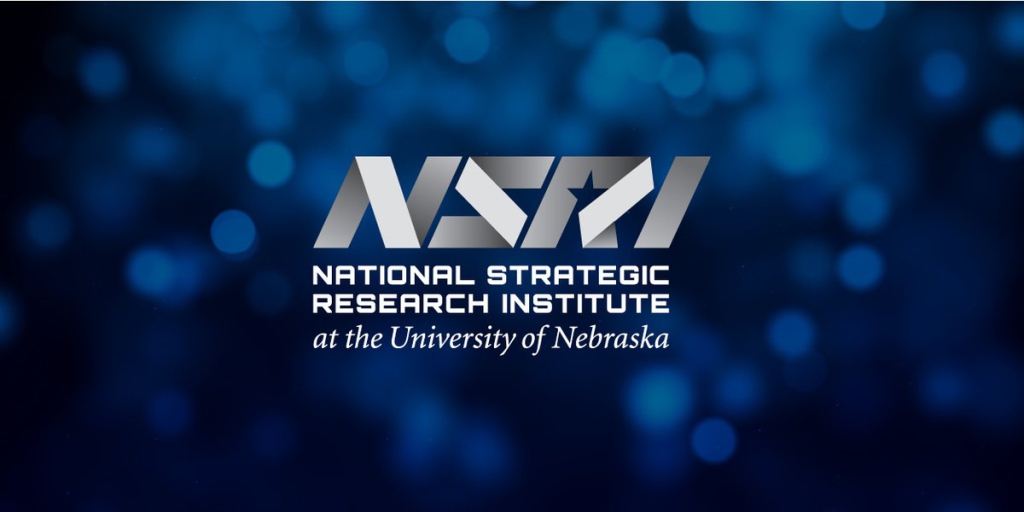National Strategic Research Institute
Katelyn Ideus, April 18, 2023
21 NU researchers appointed as NSRI Fellows
The National Strategic Research Institute at the University of Nebraska has appointed 21 NU researchers as NSRI Fellows. Hailing from the four NU campuses, the researchers span disciplines from engineering to psychology, food science to cybersecurity and more.
As a University Affiliated Research Center designated by the Department of Defense and sponsored by U.S. Strategic Command, NSRI and NU must maintain essential engineering and technology capabilities for the DOD to leverage. More than 140 NU researchers serve as NSRI Fellows to help fulfill UARC requirements and deliver solutions.
“NSRI Fellows bring forward expertise and enthusiasm to contribute solutions to our primary DOD mission areas — strategic deterrence and countering weapons of mass destruction,” said Joshua Santarpia, NSRI Fellows program director and science and technology adviser. “While NSRI serves as a trusted resource and guide, NSRI Fellows build the capacity of the four campuses and our institute to deliver. They help ensure we can meet our commitment and our mission.”
Nominated by their peers, confirmed by campus research offices and appointed by NSRI leadership, the cohort of new fellows offers a broad range of expertise that can be applied to challenges within warfighter safety, joint electromagnetic spectrum operations and NSRI’s recently launched focus area — Food, Agriculture and Environment Security.
NSRI Fellows 2023 Cohort
Listed with department and campus
- Christopher Barrett, surgery, University of Nebraska Medical Center
- Scott Barrett, psychology, University of Nebraska–Lincoln
- Elizabeth Beam, nursing, UNMC
- Byron Chaves-Elizondo, food science and technology, UNL
- Edward Fehringer, orthopedic surgery and rehabilitation, UNMC
- Keith Geluso, biology, University of Nebraska at Kearney
- Loren Giesler, plant pathology, UNL
- George Grispos, cyber security, University of Nebraska at Omaha
- Mark Hamill, surgery, UNMC
- Matt Hille, veterinary medicine and biomedical sciences, UNL
- Jerry Hudgins, electrical and computer engineering, UNL
- Kevin Kemp, surgery, UNMC
- Joseph Khoury, pathology and microbiology, UNMC
- Srivatsan Kidambi, chemical and biomolecular engineering, UNL
- Yongfeng Lu, electrical and computer engineering, UNL
- Miguel Matos, surgery, UNMC
- Micah Schott, biochemistry and molecular biology, UNMC
- Dong Wang, pharmaceutical sciences, UNMC
- Eric Weaver, virology, UNL
- Richard Wilson, plant pathology, UNL
- Sowmya Yelamanchili, anesthesiology, UNMC
Yongfeng Lu, professor of electrical and computer engineering at UNL, brings extensive expertise that can apply to EMS operations, which is critical for USSTRATCOM and Joint Force communications across the nuclear enterprise. To ensure freedom of maneuver in the EMS, the command is developing and integrating EMS capabilities across the DOD.
“We have a unique combination of knowledge and skills in these areas,” Lu said. “And we are targeting to provide engineering solutions rather than just data and ideas.”
Elizabeth Beam, assistant professor in the college of nursing, has dedicated much of her career to mission-critical training and education, working within the Nebraska Biocontainment Unit at UNMC. She also served as the principal investigator of the 2021 NSRI independent research and development project, “Educational strategy assessment for improving respiratory protection equipment use.”
“I am the granddaughter of a Nebraska World War II Hump Pilot, so I always feel a connection to the Air Force,” Beam said. “I like the idea of projects that are based in relationships and moving critical ideas forward. Several areas of my work may have applications, and I look forward to learning more about how my research interests could be helpful to NSRI’s mission.”
Joining a contingent of several fellows well-suited to contribute to the new food, agriculture and environment security NSRI focus area is Keith Geluso, professor of biology at UNL. Geluso will provide valuable knowledge with novel pandemics associated with vertebrates. He is one of few experts with field experience for mammal trapping, handling, sampling and identification.
“Looking into the future, we must know viruses and other infectious agents in mammals, particularly bats and rodents, before they mutate and cause another regional or worldwide pandemic,” Geluso said. “Understanding all different types of threats is important for all people in the U.S. and for the world. The COVID-19 pandemic highlights the challenges we will continue to face in upcoming years, including those threats that are not human-made.”
George Grispos, assistant professor of cyber security at UNO, brings forward NebraskaCYBR’s cyber operations and cyber defense accredited teaching and research capabilities. Throughout the next decade his primary concern is securing agricultural systems and equipment to avoid such technologies being used in criminal and terrorist activities.
“It is a great motivator knowing I am helping produce tomorrow’s cybersecurity workforce charged with helping to keep the homeland secure,” Grispos said. “As an NSRI Fellow, I can continue to extend my work into research with the same goal — secure the homeland.”
The nomination process for new fellows will begin Nov. 1, 2023. Learn more about the NSRI Fellows at nsri.nebraska.edu/fellows.






